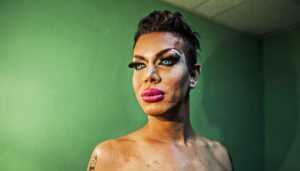Five summers ago, in June 2018, a short clip from Arrêt Sur Images, a French talk show, went viral after a balding, bearded male reprimanded the host for calling him a man. “Je ne suis pas un homme, monsieur,” Arnaud Gauthier-Fawas insisted. “I don’t know what made you say this.” When the host explained that it was due to Gauthier-Fawas’s appearance, he replied: “Really? You should not mistake my gender identity and my gender expression or we’ll get off to a bad start!” The LGBT activist then clarified that he was “non-binaire”.
The exchange became a famous WTF? moment in France. Very few took it seriously. No one realised back then that Gauthier-Fawas was the future.
Last October, I was invited onto a TV show called Quelle Époque to debate Marie Cau, France’s first transgender woman mayor. I say “debate”; I wasn’t listened to. I was described as “hysterical” by one guest for saying that I didn’t believe that Cau was a woman and my rhetoric was described as fascistic. Not one of the eight-strong panel agreed with me, and the studio audience applauded every time someone mocked me.
When I did get the chance to speak, I said: “For me, Marie Cau is a man. A transfeminine man — a person who is biologically a male but who has tastes that match with what people call ‘the woman gender’.” For this, I was branded a transphobe and I am currently being sued by Cau and three LGBT lobby groups for “hate speech”.
After the show was broadcast, the French politicians weighed in. Isabelle Rome, the minister for gender equality, diversity and equal opportunities, shared a clip of my debate on Twitter, saying: “These words are very violent. Every person needs to be respected for their gender identity or for their sexual orientation. It’s not others who have to define the contours. To use the words of Amin Maalouf: ‘It’s our gaze who liberates.’” She then invited Cau to meet her, and posted a photo of the two saying: “We need to build a fraternal society where each person is respected beyond his gender identity or sexual orientation.”
Having raged for years in the UK and US, the transgender debate has finally hit France. And you might say we deserve it; even that we are partly to blame. Back in the Sixties, a group of postmodern French philosophers introduced “French theory” to the world. It was a challenge to the idea that there is a single innate meaning in anything: we should, they assert, deconstruct language, science, even our human nature. We’ve got Derrida, Lyotard and Foucault to thank for the idea that there is no objective truth.
So far, so interesting. In France, we are philosophers. We enjoy ideas for their own sake and have no problem with letting a concept stay as it is – conceptual. But Americans are different. Their activists like to apply theory to the real world. So when Americans, such as Judith Butler, got hold of “French theory”, they applied it to American culture and political activism, which gave birth to post-colonial theory, gender theory and, inevitably, transgender ideology: the idea that language and biological sex can be deconstructed so that women become “menstruating people” and men can be mothers.
Then, the Americans threw it back at us. And that language and ideology is seeping into French culture and taking hold of young imaginations.
Only last year, Le Planning Familial (PF), a state-funded network of organisations providing sex education and reproductive services, launched a campaign with an illustration of a “pregnant man”. The poster read: “At Planning, we know that men can get pregnant, too.” The PF also stated that sex is a social construct, a gay man can have a vulva, a penis is not a male organ, and the use of the words “female and male” should be banned. This is an organisation that is providing sex education in schools across France.
French children are no different from those the world over: curious, vulnerable, easily influenced. And the more they absorb, the more they are choosing to reject the traditional gender binary and asserting their right to identify as trans or non-binary. Marry this with the move in medicine to champion a child’s right to self-determine, and we’re in dangerous waters. According to Jean Chambry, a child psychiatrist in charge of the CIAPA (Intersectoral Centre for Adolescents in Paris), a decade or so ago there were about 10 requests for gender reassignment per year; in 2020, it was 10 requests per month, in the Île-de-France region alone.
Chambry has spoken of a worrying acceleration of medical responses to these transition requests; that, as demand surges, barriers to treatment are being significantly weakened. It is currently possible for children and adolescents to be prescribed puberty blockers and hormones if their parents agree — though surgery isn’t supposed to take place before the age of 18. Yet, since last November, those wishing to commence the transitioning process no longer need a psychiatric follow-up. Medical insurance will also now cover the entire cost of a transition (including mastectomy and phalloplasty). And a new law against “conversion therapy for sexual orientation or gender identity” has made it incredibly hard for psychiatrists and psychologists to counsel gender-confused children or adults.
Today, in France, any criticism of this new orthodoxy is quickly shut down. Even our dictionary, Le Robert, has included “iel” — a gender-neutral pronoun, like “they” in English — in its online version. The word has yet to find favour with the general public.
Elsewhere, activists have also infiltrated anti-discrimination boards, which are now prioritising transphobia over racism. Consider Dilcrah, the Interministerial Delegation for the Fight Against Racism, Antisemitism and Anti-LGBT Hatred, a government body responsible for guiding public policy on discrimination. In January, it was quietly closed down. The party line is that it was dissolved because the team was inefficient. Certainly, it was inefficient when it came to finding common ground on gender ideology. Former president, Smaïn Laacher, is a member of L’Observatoire de la Petite Sirène an association set up by psychiatrists and researchers concerned about the number of children being given hormone treatment, and — despite its name: The Little Mermaid’s Observatory — absolutely not to be confused with the UK’s controversial child transgender group, Mermaids.
This proved problematic for the transactivist sociologist Karine Espineira, who dramatically resigned from Dilcrah last May to protest against Laacher’s membership. There then came a welter of accusations of transphobia against L’Observatoire, after which, in September, Dilcrah decided to file a complaint against the organisation for their recommendation of a cautious approach towards trans children — something deemed to be “conversion therapy”, now forbidden by French law. This complaint was rejected. But in January, Dilcrah was disbanded. Its dissolution arguably exemplifies the French government’s response to the current identity debate — having been captured, they fold.
Amid this growing scandal, in which any attempts at scientific discussion or any urging of caution against accepting the new status quo are shut down, where is the resistance? And where, with our grand tradition of feminist thought, are the feminists? In the UK, you have Julie Bindel, Kathleen Stock and J.K. Rowling. In France, it seems, we no longer have feminists in the traditional sense: we have neo-feminists and “queerists”. They aren’t worried about women’s spaces being kept safe, they don’t blink an eye at women’s sports being debauched, and they think it’s perfectly fine for lesbians to date women with penises. These feminists are, as Germaine Greer said, “being persuaded to deny their own existence”.
Since 2019, “Nous Toutes” — a group with the specific aim of stopping violence against women and girls — have organised feminist marches in towns across France. But their Instagram feed is now alive with anger and posts reading “Terfs out of our fights” and “You don’t need a vagina to be a woman”. It seems even they have lost sight of what our universalist feminism was about — a collective struggle, not an individual one. Such is the vehemence of their feeling against old-school feminist views that when Marguerite Stern, a prominent gender-critical activist and colleague of mine, marched with the sign “Female Sex Matters”, an egg was thrown in her face. This struggle is not a collective one.
How did French feminism become corrupted? Perhaps because of our obsession with Simone de Beauvoir. She believed that female biology was real, but also that it hampered women; she saw it as a constraint. She also believed that women are shaped by society and men into accepting a passive, subjugated position. In Le Deuxième Sexe (1949), she writes: “One is not born but, rather becomes, a woman.” She talked about how we are forced into becoming housewives or mothers. But neofeminists, led by Butler, have deconstructed this and now brandish the slogan as though de Beauvoir were talking about transwomen.
These neofeminists have also co-opted Monique Wittig, the French radical feminist and lesbian who wrote: “There is no sex. There is but sex that is oppressed, and sex that oppresses. It is the oppression that creates sex, and not the contrary.” The neofeminists parrot the handy Instagrammable statement “there is no sex” out of context and without understanding.
Resist these misreadings, though, and you will be tarred as a Terf. And it is dangerous to be a Terf in France. In March, on International Women’s Day, the walls of Paris were daubed with “Kill the Terfs” graffiti. A conference in Nantes was cancelled because transactivists threatened speakers with eggs and baseball bats, and cowardly local politicians bowed to that pressure. Last year, a class given at the prestigious Sciences Po school was shelved amid concerns over its topic: Darwinism, evolutive psychology and differences between the sexes. If our scientists have been captured, what hope is there?
At last, though, there are signs of a French resistance. In January — after three years of harassment, insults and cancellations – Marguerite Stern and I launched Femelliste, an online platform and NGO for “the female of the species”, a place where women can voice their concerns about transgenderism. Here we assert things such as: being a human female is neither a shame nor a weakness; it is not a feeling but a biological and sexual reality. We truly sympathise with those dealing with gender dysphoria, but see transgender activism, and its language, as an attempt to reduce women’s rights.
We are fighting for freedom of expression and pluralism of ideas. And for this, we are currently being sued, accused of “hate speech”. But we Femellistes are not transphobes. On the contrary, in our manifesto, we state explicitly that we recognise the suffering of dysphoric people, as well as the violence that trans people experience. We absolutely understand that.
But we also understand that, in France, feminism is dying. In France, today, if you dare to go on a feminist march and protest for women’s rights, you will be abused. In France, if you write or talk about women’s rights, you will be blacklisted. In France, the birthplace of philosophical feminism, the answer to the question “What is it to be a woman?” is no longer obvious to everyone. But in France, some women are finally daring to fight back.
Disclaimer
Some of the posts we share are controversial and we do not necessarily agree with them in the whole extend. Sometimes we agree with the content or part of it but we do not agree with the narration or language. Nevertheless we find them somehow interesting, valuable and/or informative or we share them, because we strongly believe in freedom of speech, free press and journalism. We strongly encourage you to have a critical approach to all the content, do your own research and analysis to build your own opinion.
We would be glad to have your feedback.
Source: UnHerd Read the original article here: https://unherd.com/





